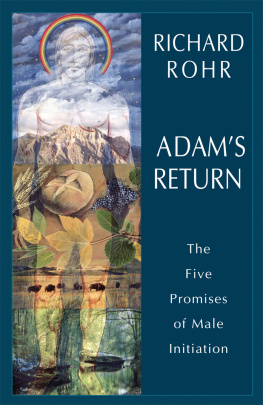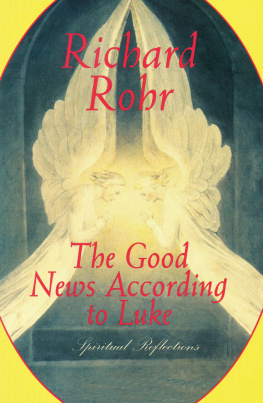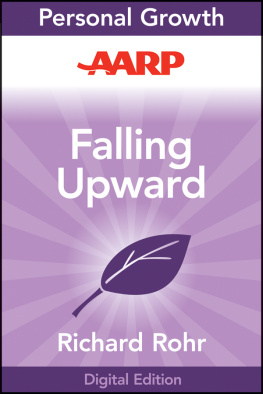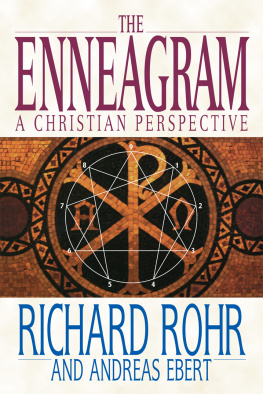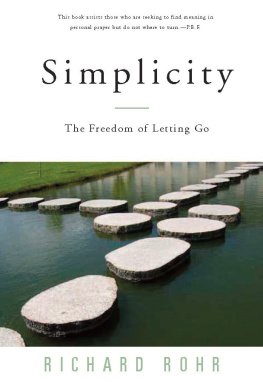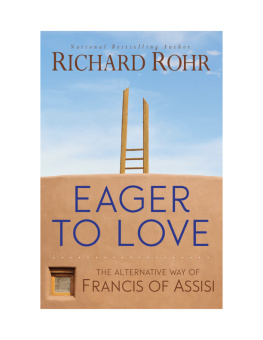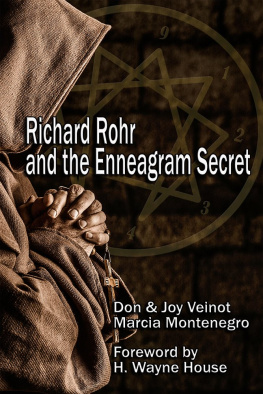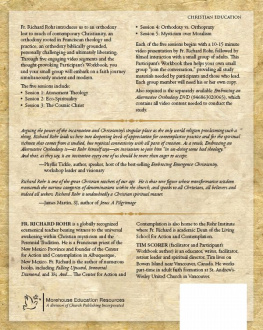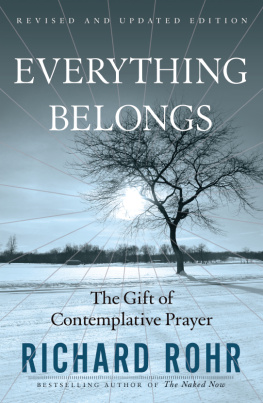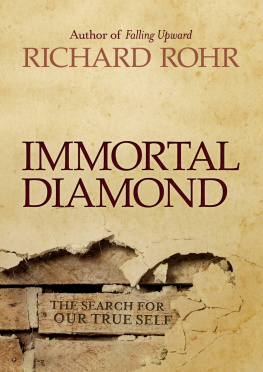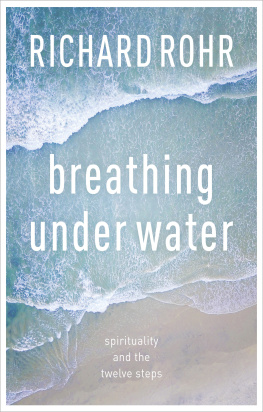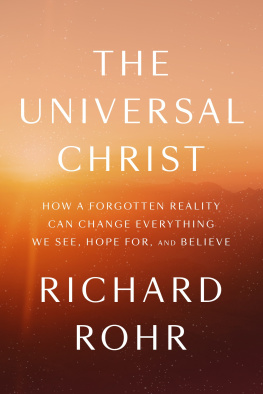
Also by Richard Rohr
Everything Belongs, 1999, revised and updated edition, 2003
Called, Formed, Sent, with Thomas C. Welch, 2002
The Enneagram: A Christian Perspective, with Andreas Ebert, 2001
Hope Against Darkness: The Transforming Vision of St. Francis of Assisi in an Age of Anxiety, with John Bookser Feister, 2001
The Good News According to Luke: Spiritual Reflections, 1997
Jesus Plan for a New World: The Sermon on the Mount, with John Bookser Feister, 1996
Job and the Mystery of Suffering: Spiritual Reflections, 1996
Enneagram II: Advancing Spiritual Discernment, 1995
Radical Grace: Daily Meditations, 1995
Quest for the Grail, 1994
Near Occasions of Grace, 1993
Experiencing the Enneagram, with Andreas Ebert et al., 1992
The Wild Mans Journey: Reflections on Male Spirituality, revised edition (with Joseph Martos), 1992, 1996
Simplicity: The Art of Living, 1991
Discovering the Enneagram: An Ancient Tool for a New Spiritual Journey, with Andreas Ebert, 1990
Why Be Catholic? Understanding our Experience and Tradition, with Joseph Martos, 1989
The Great Themes of Scripture: New Testament, with Joseph Martos, 1988
The Great Themes of Scripture: Old Testament, with Joseph Martos, 1987

Vacillation, by William Butler Yeats, is reprinted with the permission of Scribner, an imprint of Simon & Schuster Adult Publishing Group, from The Collected Works of W. B. Yeats, vol. 1: The Poems, Revised, edited by Richard J. Finneran. Copyright 1933 by The Macmillan Company; copyright renewed 1961 by Bertha Georgie Yeats.
For the Time Being, copyright 1944 and renewed 1972 by W. H. Auden, from Collected Poems by W. H. Auden. Used by permission of Random House, Inc.
Healing by D. H. Lawrence from The Complete Poems of D. H. Lawrence, edited by V. de Sola Pinto and F. W. Roberts, copyright 1964, 1971 by Angelo Ravagli and C. M. Weekley, Executors of the Estate of Frieda Lawrence Ravagli. Used by permission of Viking Penguin, a division of Penguin Group (USA) Inc.
This printing: June 2016
The Crossroad Publishing Company
www.crossroadpublishing.com
Copyright 2004 by Richard Rohr
All rights reserved. No part of this book may be reproduced, stored in a retrieval system, or transmitted, in any form or by any means, electronic, mechanical, photocopying, recording, or otherwise, without the written permission of The Crossroad Publishing Company.
This book is typeset in 12/16 Stone Informal. The display type is Tiepolo.
Printed in the United States of America
Library of Congress Cataloging-in-Publication Data
Rohr, Richard.
Adams return : the five promises of male initiation / Richard Rohr.
p. cm.
Includes bibliographical references.
ISBN 978-0-8245-2498-2 (alk. paper)
1. MenReligious life. 2. Spiritual lifeChristianity. I. Title.
BV4440.R64 2004
248.2dc22
2004014956
Adamah, the first human name, means of the earth.
For all the sons of Adam:
For those who are ashamed of being earth,
For those who love being earth too much,
For those who possess none of the earth,
For those who possess too much of it,
For those who need to know they are earth,
And try to flee to heaven out of shame,
Doubting the garden that they already have,
Abandoning the garden that they already are,
I dedicate this map of return.

CONTENTS


I WOULD LIKE YOU to know a bit about my background at the very beginning. Perhaps it will help you appreciate why I wrote this book. My educational background is in philosophy and theology, and I am self-educated in psychology and sacred story. I am a believing Catholic Christian, a Franciscan by spiritual choice, a spiritual director and community guide by experience, a teacher by gift, and a quasi hermit by preference. I read scholars but am not myself a scholar.
I am a synthesizer of sorts. My task is to get good news to the masses, not making it an elite or academic exercise for an in group. As St. Gregory of Nyssa (335395) described his own job, mine is to chew on the appropriate texts and make them delectable. This book is the result of having chewed on plenty of initiation texts, ancient and new, over a period of fifteen years, and I hope the reader will find the result both tasty and nourishing.
This book is written by a white, middle-class American, who is secure, overeducated, ordained, unmarried, and male. Men like me are much of the structural and spiritual problem. We are sitting comfortably at the supposed top of the pile. And yet that truth, more than anything else, is why I must write this book. Men like me, with access to all manner of privilege and freedom not
Traditional initiation rites did just the opposite; they interpreted ordinary men from withincrediting maleness with its own innate spiritualityand worked at bringing men to wholeness from the bottom up, and from the inside out. I will try to do the same here, in the face of a culture, and a church, that usually tries to interpret men from the top down and from the outside in. Such a technique will never work, in my opinion, and it has not been working for some time. Our religious institutions are not giving very many men access to credible encounters with the Holy or even with their own wholeness. We largely give men mandates, scaffolding, signposts, and appealing images that tend to create religious identity and boundaries from the outside. But true happiness, like true enlightenment, is always an inside job. We will finally have to rely upon our own experience anyway, so we might as well guide men toward authentic religious experience. This is the true meaning of tradition, I think.
Though I am not a cultural anthropologist, nor an ethnologist, nor a sacramental theologian, I have talked to some experts, read everything I could,retreats and male initiation rites for the past twenty years. I have traveled a great deal in doing so, giving conferences for men in North, South, and Central America, Eastern and Western Europe, and several parts of Asia, Africa, and Australia, and talked firsthand to formally initiated men in several cultures. My education on this subject has been largely in the field and on site, including fifteen years as a pastor of a lay community in Cincinnati and fifteen years as an Albuquerque county jail chaplain. All of which has told me who should be listened to and what is worth reading. I hope that puts this theory in touch with some kind of concrete practice. Lets call it theology from below, which for me is the very meaning of the Incarnation and the descent of the Holy Spirit.
My continuing momentum in this work has been a rather constant sadness and disappointment over the lack of an inner life in so many men I meet, even among ministers, religious, and devoted laymen, and high-level and successful leaders from whom we would expect more. It is not their fault, if fault must be named. Usually no one has offered them anything more than Jacobs cheap soup. We are sons of Esau, having sold our birthright for fast-food religion (Genesis 25:2934). It does not deeply transform the self or the world.
Next page
